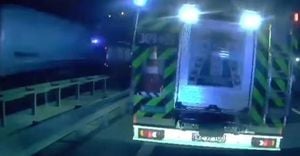On March 14, 2025, volunteers from the Search Warriors made a chilling discovery on a ranch linked to the Jalisco Nueva Generación drug cartel, often referred to as one of the world's most ruthless drug trafficking organizations. The area, which police had previously searched six months prior without significant findings, was littered with personal belongings including shoes, clothing, and empty wallets, indicating the grim reality faced by many victims.
Among the harrowing remnants, volunteers identified human remains, leading to immediate concerns about the scale of violence and the possible links to the cartel's operations. The ranch served not only as a training camp but as a site where young individuals were reported kidnapped and mistreated under the deceptive promise of employment opportunities.
Mexican President Claudia Sheinbaum described the discovery as "a painful finding" and underscored the necessity for thorough investigations concerning the local police's role during the earlier expedition, which many now suspect was ineffective due to potential cover-ups. "We must look critically at how this occurred and what might have been missed in our previous search," she stated, illustrating the compounded frustration felt by families of missing individuals.
The public prosecutor corroborated the president's statements, admitting, “We will investigate what went wrong and who is responsible.” This acknowledgment reflects the growing scrutiny around police operations and accountability within the local law enforcement community, especially as the national crisis of missing persons rises unchecked. Over 120,000 individuals are unaccounted for across Mexico, with many believed to be victims of violence perpetrated by drug cartels.
The horrific narratives surrounding the cartel's activities have been painted by survivors themselves, including young women who have escaped its clutch. A captured individual shared their ordeal of sexual abuse and organ trafficking by the cartel's leaders, hidden beneath the guise of employment promises. “Many were lured with good salaries but faced severe violence upon arrival,” she said, underscoring the risks faced by vulnerable populations.
Within the Mexican state of Jalisco itself, reports indicate at least 15,000 residents are currently missing, exemplifying how deep and pervasive the problem has become. The ranch's operational history has raised alarms not just within Jalisco but nationwide as it feeds the unending crisis stemming from drug-related violence.
Every discovery brings renewed calls from family members, activists, and human rights organizations pushing for more proactive measures to address the alarming rates of disappearances. The search for accountability and justice continues as volunteers and local communities work tirelessly, striving to bring upon light what often remains concealed.
Activists express their outrage, demanding thorough investigations and reforms to prevent similar lapses from occurring again and to honor the memories of those lost. Indeed, the grim locale serves as both graveyard and training ground, exposing the brutality of the drug war—where countless lives are forever changed. "Our task is monumental, but necessary," declared one of the Search Warriors as their quest for answers presses on.
Though the road to recovery and justice seems long, the strength and determination exhibited by those dedicated to finding closure for the missing keeps hope alive. The shocking revelations serve as painful reminders of the human cost of drug cartel violence, compelling the nation to confront its reality—the fight against this criminality is far from over.
With the investigation still fresh, many await the next steps from authorities, hoping for tangible actions and reforms rather than just promises. The eyes of both national and international communities will remain focused on Jalisco as the story continues to evolve, driven by the resolve of those who refuse to let their loved ones be forgotten.



